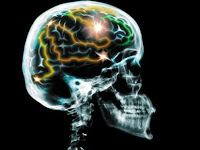 Weight loss is all in the mind, you know. Well maybe not all in the mind, but mostly in the mind, it’s true. According to some fascinating new research, your nervous system, not your eating habits have the biggest role in determining whether you are fat or thin.The study conducted at the University of California, San Francisco, looked at serotonin levels in the nervous systems of worms. Serotonin is a neurotransmitter, which means it conducts messages across and among nerve cells. The researchers found that serotonin regulates feeding and calorie burning independently of each other. In other words, serotonin regulates not only how much you eat and want to eat (your appetite), but also what your body does with food once it has been consumed.
Weight loss is all in the mind, you know. Well maybe not all in the mind, but mostly in the mind, it’s true. According to some fascinating new research, your nervous system, not your eating habits have the biggest role in determining whether you are fat or thin.The study conducted at the University of California, San Francisco, looked at serotonin levels in the nervous systems of worms. Serotonin is a neurotransmitter, which means it conducts messages across and among nerve cells. The researchers found that serotonin regulates feeding and calorie burning independently of each other. In other words, serotonin regulates not only how much you eat and want to eat (your appetite), but also what your body does with food once it has been consumed.
In worms, serotonin levels are a function of food availability. When resources are low, serotonin levels decrease and the worms go into fat storage mode. Interestingly, low serotonin also leads to decreased appetite in worms. Makes sense, when food availability is tight, worms get less hungry–after all, no food, no need to eat. They also become more efficient at storing energy as fat for the long haul. A perfect feat of optimized neural regulation. On the other hand, when food resources are high, serotonin levels increase and worms get hungrier and become more efficient at burning fuel. If we could only all be so lucky. Humans actually experience the opposite effect: when food resources are low, serotonin levels decrease, which causes appetites to go up and, unfortunately, fat to accumulate.
So why does this matter? This study shows is that although our eating behaviors–what we eat and how much of it–are important, they do not tell the whole story. The body actually has a very sophisticated neurological regulatory system which is more instrumental in our propensity to take in and store fat. The nervous system gauges nutrient availability (really folks, you’ve got to read The Six Keys To Optimal Health, it’s all in there) and determines whether to burn when in excess or hold on to when deficient in nutrients. In plain language, you can starve yourself on tofu shakes all you want, if you are not getting the right nutrients in the proper amounts, your body will increase your appetite–through lowered serotonin levels–to ensure that more nutrients come in.* And low serotonin means increased fat storage.
 What makes these findings interesting to me is that I am certain that we have direct control over our neurology. And we have this control through our minds. How is uncertain right now, but findings like these only strengthen my convictions. If the nervous system is the information superhighway between our brains and our bodies**, and if we can find a way to influence serotonin regulation–and I don’t mean through the use of selective serotonin reuptake inhibitors, either–through specific mental processes, then weight management could be under our individual control in the near future. I do believe it’s possible, naysayers. Just a matter of time before we figure out how. Findings like these always get my intellectual juices flowing, and I can’t help but imagine what future innovations lie ahead in this regard. Whatever that may be sure looks promising to me.
What makes these findings interesting to me is that I am certain that we have direct control over our neurology. And we have this control through our minds. How is uncertain right now, but findings like these only strengthen my convictions. If the nervous system is the information superhighway between our brains and our bodies**, and if we can find a way to influence serotonin regulation–and I don’t mean through the use of selective serotonin reuptake inhibitors, either–through specific mental processes, then weight management could be under our individual control in the near future. I do believe it’s possible, naysayers. Just a matter of time before we figure out how. Findings like these always get my intellectual juices flowing, and I can’t help but imagine what future innovations lie ahead in this regard. Whatever that may be sure looks promising to me.
*Your body just wants nutrients; it can only get those nutrients from food, and doesn’t know whether you’ll be feeding it broccoli or Cheetos; all it can do is increase the appetite and wait.
**And don’t forget that the ultimate way to optimize and maintain your delicate nervous system is through safe, natural chiropractic care.











